| |
|
Sunday, April 20 Beth Am~Second Night Seder
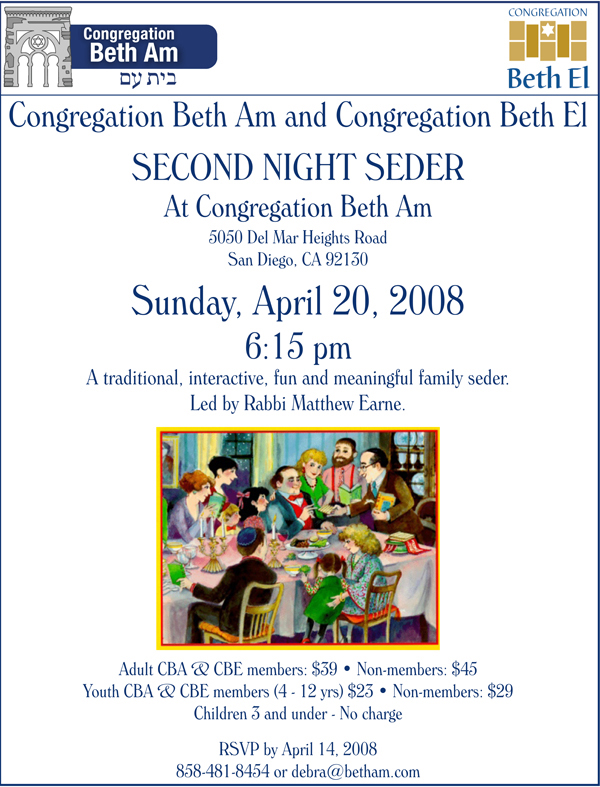
FRIDAY, MAY 9Shabbat service celebrating Israel at 60

Sunday, May 18 Community Israel Independence CelebrationWednesday, May 28 JFS~Ellen Saks lecture on mental illness
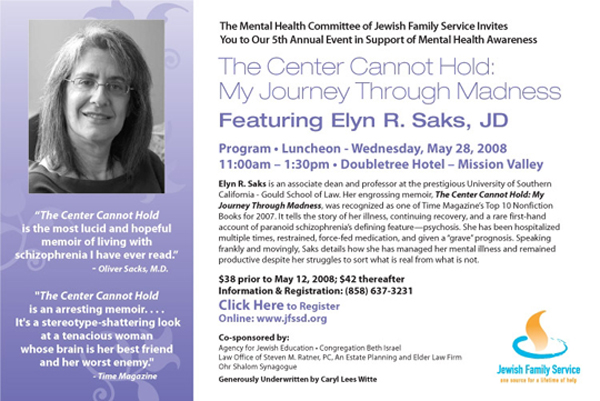

LETTER FROM JERUSALEM
Notes from ever-changing Hagaddot
By Ira Sharkansky
 JERUSALEM—On the verge of Passover I hear about Christian churches that celebrate a Seder. JERUSALEM—On the verge of Passover I hear about Christian churches that celebrate a Seder.
Ecumenicalism is welcome. The story of the Exodus is one of the great themes of literature. It emphasizes freedom from slavery, which we can revise to be a release from all kinds of oppression or limited opportunities.
The Haggadah (loosely translated as "story") used to guide the Seder tells the story of the Exodus. It includes rabbinical teaching about the holiday, as well as instructions on how to work toward the festive meal (blessings, hand washing, ceremonial glasses of wine and food meant to symbolize slavery and freedom), as well as prayers and songs to be done after the meal.
 There are no Haggadah police to insure that each family does it all, and properly. There are different versions of the Haggadah, and families vary in how much they read, in what language, what songs they sing, what food they eat, and how the more well-informed explain the ritual to the less well-informed. The kibbutzim of Israel, feminists, Reform and Conservative Jews, humanists and others have produced their own Haggadot (the plural of Haggadah) to emphasize, add, or eliminate what serves their perspectives. There are no Haggadah police to insure that each family does it all, and properly. There are different versions of the Haggadah, and families vary in how much they read, in what language, what songs they sing, what food they eat, and how the more well-informed explain the ritual to the less well-informed. The kibbutzim of Israel, feminists, Reform and Conservative Jews, humanists and others have produced their own Haggadot (the plural of Haggadah) to emphasize, add, or eliminate what serves their perspectives.
Given the wide tent that has been constructed over the themes of Exodus, Passover, and the Seder, we should not be surprised that some Christians add Jesus to the ceremony. In one version he comes into the celebration along with the prophet Elijah. For Jews, this is bizarre and goes against more than 2,000 years of tradition. For Christians, it fits with the notion that Elijah has a role in bringing forth the Messiah.
Reform Jews have also laid a hand on the Seder. After the meal, conventional Haggadot include a passage that asks God to pour out his fury against the goyim that do not know him.
The Reform Haggadah rejects that perspective. "In . . . times of terror, some (Jews) shouted defiant words into the night. . . . Other voices call for a different response to hatred and prejudice, for the Jewish spirit burns with a passion for peace. In every generation, courageous souls seek understanding with those who oppose us . . . "
No doubt this is more politically correct than the conventional Haggadah, especially for Jews living in a Diaspora. Reform rabbis describe their Haggadah as suitable for all those sitting around the table. Consistent with other features of the Reform ritual, its language is gender-neutral.
One can view the request to curse the goyim as an anachronism or current. That depends on whether the goyim in mind are the Christians who slaughtered Jews in the Middle Ages, those who carried out the Holocaust, or Arabs who aspire to kill Jews today.
If a Jewish passion for peace clashes with Jewish defiance, Israel's morning headlines encourage defiance. Palestinian president Mahmoud Abbas has decided to award the highest decoration for bravery for two women in Israeli prisons. One of them drove the bomber to Jerusalem's Sbaro restaurant in August, 2001 who took 15 lives and injured more than one hundred. Another used the internet to seduce a teenager to meet her in Ramallah, where her friends killed him. Other headlines report on IDF casualties in Gaza, and rockets falling on Sderot.
For those unfamiliar with Hebrew, "goyim" is not necessarily a negative term. It appears in traditional writing from the Bible onward, and means nations or people who are not Jews.
Religious ritual is an open code, subject to change according to one's circumstances.
Jewish men who follow the Reform ritual do not thank God for making them men, and the Reform prayer for the end of the Sabbath does not thank God for separating the Jews from the goyim.
Some of the more curious elements in non-Jewish traditions include
- Joseph Smith's translation of Genesis that begins with a conversation between God and Moses about Jesus. (Pearl of Great Price, Book of Moses, Chapter 1) My reading of Mormon texts has not uncovered the language from which Smith translated Genesis.
- Christians translations of Isaiah add explicit predictions of the stories told in the New Testament. Chapter 7:14 has been read as, "Therefore the Lord himself will give you a sign. The virgin will be with child and will give birth to a son, and they will call him Immanuel." The conventional Jewish translation of "almah" is young woman or maiden, not necessarily a virgin.
- A Christian translation of Isaiah Chapters 52-53, about a suffering servant, says that the Lord revealed his power to a man who was "pierced." This fits the story of the Crucifixion but is not supported by the Hebrew "mokeh," usually translated as "struck." Traditional Jewish commentators view the suffering servant as a symbol for the Israelite nation or as Isaiah's view of himself.
Alterations of conventional rituals or aged text should not surprise anyone familiar with the varieties of religious experience. We should guard against an emotional response to spiritual oddities.
However you practice (or do not practice) the Seder, may you have a pleasant Passover, as kosher (or not) as you desire. And may we all be liberated from everything unpleasant.


FROM THE SIDELINES
Jimmy Carter's unwelcome benevolence
By Rabbi Dow Marmur
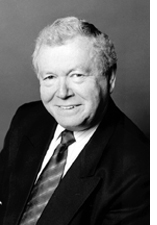 JERUSALEM—If the Hamas leaders were savvy and sophisticated, they’d let Jimmy Carter, America's 39th President currently on a visit to the region, pick up Gilad Shalit, the Israeli soldier held captive for almost two years, and return him to his family. Perhaps Shalit’s father hoped for it when he met with Carter a few days ago. JERUSALEM—If the Hamas leaders were savvy and sophisticated, they’d let Jimmy Carter, America's 39th President currently on a visit to the region, pick up Gilad Shalit, the Israeli soldier held captive for almost two years, and return him to his family. Perhaps Shalit’s father hoped for it when he met with Carter a few days ago.
But that’s not likely to happen. Hamas knows how to exploit victimhood, not how to show magnanimity and imagination. The fact that Carter’s “coup” would diminish Olmert in the eyes of Israel’s would-be electors and give the (probably false) impression that the efforts to bring back Gilad have been feeble will not sway his captors.
There’s also a practical reason why Hamas won’t do it. It wants hundreds of Palestinians in Israeli jails to be released in exchange. The reason why the matter hasn’t yet been resolved is probably because the price Hamas demands is too high. Yes, in the past Israel has released an inordinate number of prisoners in exchange of one or two of its own, but this time the enemy may want more than Israel can afford.
 If Carter brought Gilad home, Hamas would get good publicity but little else. As it gets (undeserved) good publicity now, because the world loves “victims,” it can do without the imaginative gesture. Carter seems to know it, for he has offered to mediate between Israel and Hamas. In view of the ex-President’s less than warm, and less than fair, views about the Jewish state, there’s no reason why its government should agree. If Carter brought Gilad home, Hamas would get good publicity but little else. As it gets (undeserved) good publicity now, because the world loves “victims,” it can do without the imaginative gesture. Carter seems to know it, for he has offered to mediate between Israel and Hamas. In view of the ex-President’s less than warm, and less than fair, views about the Jewish state, there’s no reason why its government should agree.
To negotiate with kidnappers, even in the context of prisoner exchange, is a tough business. During World War II, Stalin’s son was captured by the Germans. They were prepared to release him in exchange for Nazi generals and other prisoners of war. Stalin is said to have refused on the grounds that “war’s war.” Now, by all accounts, caring for his family wasn’t a priority for him. He was a brutal tyrant for whom saving his son from captivity wasn’t on his agenda. But in the overall context, though his response was inhuman, it may nevertheless have been the “right” thing to do.
Mercifully, Jewish leaders are different. They’d like to see Gilad Shalit freed, especially since it’s likely that the two soldiers captured by Hezbollah around the same time are no longer alive. But as politicians they’re afraid that the price may be too high, not only because the outrage that the release of the Palestinian prisoners would cause among the families of their victims, but also because the exchange could be understood as a kind of endorsement of the terrorists’ continuous efforts to capture Israeli soldiers, as evidenced by several incidents in recent times.
Politics is a tough business, too. Stalin had no scruples. By contrast, Israeli leaders agonize. We should be grateful for it even as we feel for the Shalit family.
The Prime Minister and the Leader of the Opposition have given Carter the cold shoulder. President Peres received him but scolded him for going to see Khaled Mashaal, the Hamas leader in Damascus. The media, and perhaps the public at large, are in two minds as to whether to confront Carter would have been better than to shun him; after all, he’s a co-signatory to the accord that brought peace between Egypt and Israel.
For most Israelis, I surmise, Carter’s visit is a nuisance. His ostensible benevolence isn’t welcome here. Perhaps it would have been better had he stayed on his peanut farm or engaged in “good work” somewhere else in the world.
 |
Balloon Utopia
Sandi Masori
619 339 8024
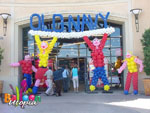 |
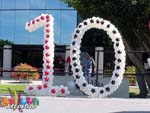
! |
 |


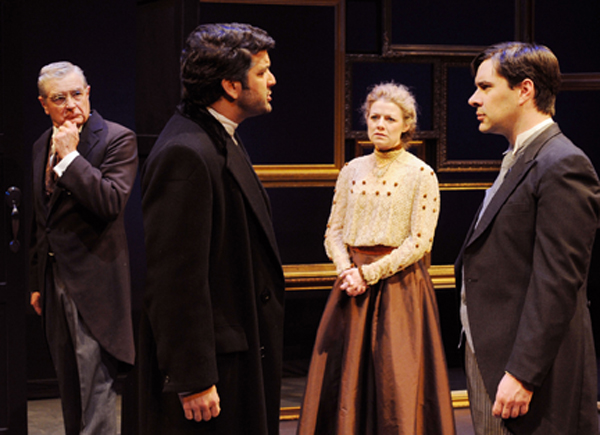
ARTS IN REVIEW
If your family made its fortune by theft, would you willingly return the money?
By Carol Davis
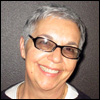 CORONADO, California -- If anyone going to see Harley Grantville-Barker’s The Voysey Inheritance adapted by David Mamet, at Lamb’s Players Theatre in Coronado and is expecting a barrage of expletive deletives, forget it. Mamet, whose plays include “Glengarry Glen Ross” (1984), “Speed The Plow” (1988) and “Oleanna”(1992) to name a few is noted for his use of strong, obscene and abusive language. His dialogue and conversation in the above plays is often true to the point and more realistic than one might like to hear but it is nonetheless, the way real people talk. CORONADO, California -- If anyone going to see Harley Grantville-Barker’s The Voysey Inheritance adapted by David Mamet, at Lamb’s Players Theatre in Coronado and is expecting a barrage of expletive deletives, forget it. Mamet, whose plays include “Glengarry Glen Ross” (1984), “Speed The Plow” (1988) and “Oleanna”(1992) to name a few is noted for his use of strong, obscene and abusive language. His dialogue and conversation in the above plays is often true to the point and more realistic than one might like to hear but it is nonetheless, the way real people talk.
To the contrary, Mamet simply took a very wordy, but current topic of interest play (which we will get into soon enough), “The Voysey Inheritance”, streamlined it, moved scenes around and shrunk some of the cast of characters with an end result of a compact, economical and thought provoking work which lasted two hours rather than the usual three. While Grantville-Barker’s play was written at the turn of the century England (1908) and deals with money, morality and mendacity this very topic has been showing up as lead stories in our national press over the last few years. We need look no further than our local politicians.
Mamet was born to a Jewish family in Chicago in 1947. In recent years his books include The Old Religion (1997), a novel about the lynching of Leo Frank; A Torah Commentary with Rabbi Harold Kushner, Five Cities of Refuge: Weekly Reflections on Genesis, Exodus, Leviticus, Numbers and Deuteronomy (20064) and The Wicked Son (2006), a study of Self Hatred and anti-Semitism. His adaptation of “The Voysey Inheritance” was prompted by its relevancy and for the Mint Theatre’s revival of this early drama.
Lamb’s Players Theatre, under the astute direction of Deborah Gilmour Smyth and with a fine ensemble of players has a nice, tight little production on their hands. Jeanne Reith’s period costumes and Robert Smyth’s minimalist set, (empty frames hanging over the sitting room and reaching to the ceiling) Nate Parde’s effective lighting and Deborah Gilmour Smyth’s sound design set the stage for the Voysey Family to come to grips with a nasty little secret Mr. Voysey has been keeping under wraps since he inherited it from his own father.
Edward (Jon Lorenz), Major Booth Voysey (Jason Heil), Ethel Voysey (Season Duffy), Honor Voysey (Colleen Kollar Smith), Terenchard Voysey (Lance Arthur Smith), Hugh Voysey (Kurt Norby) Mr. and Mrs. Voysey (Jim Chovick and Glynn Bedington) make up the Voysey family. Chovick and Bedington are both on target; she as the sly but deaf matriarch and he as the all knowing head of the family)
The senior Voyseys had and have been routinely embezzling funds from their clients’ trust accounts; accounts they have been managing and living high off the hog with. Now it is time for Edward, (Jon Lorenz is sincere in his urgings) the one son who has shown an interest in money management, to inherit the job of keeping the books and looking after the family business (trusts and real estate law). While working on the records he discovers ‘the emperor has no clothes’, the Voysey house of cards is about to collapse.
Edward is horrified by his father’s conduct and business practices, or lack thereof and wants to rectify the situation. In a confrontation with him, the older Voysey confesses, “We do what we must” and chides Edward of ‘thinking the worse’ of his parents. “I stepped outside the letter of the law to protect my father,” he bemoans as he tries to justify his own actions.
When his father dies, Edward calls a family meeting to let his siblings in on the financial mess they are dealing with. When they hear of Edward’s plan to make everything right, put the money back where it rightfully belongs and live within their means, and/or face the possibility of bankruptcy, every one of his family tries to rationalize why he should continue on their father’s fraudulent path of speculating in the stock market with their clients’ money and hopefully continuing their high society lifestyle.
With each of the Voysey offspring expressing their own selfish reasons to continue business as usual, Edward vacillates back and forth and is finally brought back by his own high moral standards. It isn’t easy, however, especially when their father’s secretary, Peacey (Ralph Johnson is at his best) pays a visit at Christmas for his annual check (read blackmail) and demands a bonus to send to his son to help with college (or else) or when his father’s longtime client and personal friend, George Booth (Michael Harvey is convincing), who also happened to profit immensely from his friends investments, decides he wants all his money taken out of the trust.
Each of the children takes a turn at trying to convince Edward to see things his way. Especially powerful is Jason Heil as the proper officer, Major Booth Voysey, who will hear nothing less than their return to normalcy. The women in the family save for the mother are shallow and spoiled. They pout and wallow, but have no influence over their brothers. The only one sympathetic ear Edward has is his fiancée Alice (Ayla Yarkut).
Lamb’s is at its best at period pieces and this is no exception. The good news is that while the play is a drawing room drama set over one hundred years ago, it is still relevant today. The bad news is that it is still relevant today. Now as then, corruption continues at the highest of levels. ‘Nuff’ said. Lamb’s does a fine bringing it to our attention again.
The Voysey Inheritance continues through May 18.
See you at the theatre.
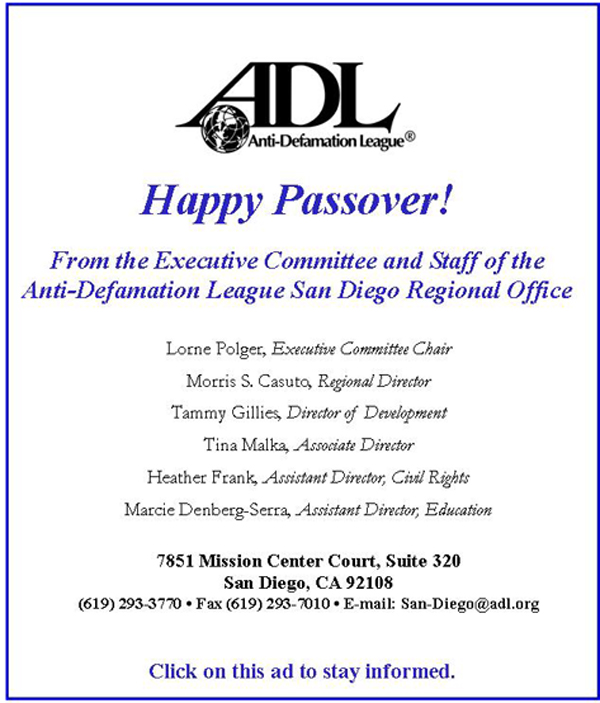

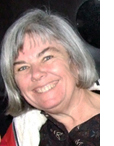
 Nancy Harrison Nancy Harrison
cruise & tour specialist
(619) 265-0808
Not only better prices, but excellent, caring service!

ADVENTURES IN SAN DIEGO JEWISH HISTORY
Editor's Note: Following are some stories from the Southwestern Jewish Press from 1949. If you have historical topics about the San Diego Jewish community you would like us to explore, please e-mail your suggestions to editor Don Harrison at sdheritage@cox.net
Birdie Stodel B.B.
By Jeanne Camiel
From Southwestern Jewish Press, April 1949, page 3
Our best wishes for this new enterprise—we know that it will be an asset to our community. Realizing that this paper will reach many people who do not know of the work of our organization, we are acquainting the Jewish Press readers with some of our major philanthropies.
Since May, 1948, B’nai B’rith women have sent more than a million dollars worth of food, clothing, medical supplies, and automotive equipment to Israel, in addition to knitting quantities of mufflers, gloves and socks for shipment to Israel.
The Leo N. Levi Memorial Hospital at Hot Springs National Park, Arkansas, a beneficiary of B.B., is {sic, helps} the needy sufferers from arthritis and kindred diseases. The National Jewish Hospital in Denver Colorado; Bellefaire Orphan Home in Cleveland, Ohio; the Stepney Girls Settlement in London, England; the Palestine Home to rehabilitate maladjusted refugee children; the Home in Shanghai, China; and one in Cuba also received our contributions.
We are particularly proud of our local Hillel counsellorship at State—43 books contributed by our members and chapter have been added to the Hillel Library recently.
Lack of space prevents listing our many, many other worthwhile projects. Our work on anti-defamation alone should interest every Jewish woman in joining our ranks and taking part in our activities. We need all of you and extend a warm welcome for you to attend our meetings every second and fourth Monday at the Temple Center.
Dafni Keynotes Fund Opening
From Southwestern Jewish Press, April 1949, page 10
Reuven Dafni, Israeli consul for the West Coast, officially opened the 1949 Campaign at an open meeting of the United Jewish Fund in the Temple Beth Israel last Sunday night. The meeting was sponsored by the Presidents Council.
Pointing out that 50,000 refugees of the 185,000 who have entered Israel since statehood are still in camps because of the lack of facilities to integrate them into the Country, Dafni urged full support of the Fund program for this year. He said that the investment in Israel this year may well end the Refugee problem because if they are integrated into the economy of the country they will no longer be wards of the Jewish community.
Campaign leaders were introduced at the Rally and Lou Steinman, co-chairman with Saul Chenkin of the drive, spoke of his recent trip to Israel.
Steinman, who had the overflowing crowd in laughter with his humorous style of speaking and down to earth conversation, told of his experiences in traveling from the United States.
“We left the Country on January 25 on an American boat,” Steinman related, “with one way tickets in our pockets. After all there was still a war on and if we were to get shot what was the use of a round trip fare. Every port we hit we were propositioned on the black market exchange of funds. Everyone wanted to change currency with us, at rates far in excess of the legal limit. That is until we came to Israel where we had to get an advance from the hotel to pay for our cab fare. The patriotic citizens of that country will do business only in Israeli pounds.”
Pointing out the need for cash to spur the development of Israel now so that those refugees in the camps, who are very anxious to go to work and are patiently awaiting the opportunity to start have finally been saved, Steinman explained that the spirit of the refugees is very admirable and determined.
Lou and Mrs. Steinman traveled unescorted through Israel and bring back first hand reports of what the aid of American Jewry is accomplishing. Steinman concluded his talk by emphasizing that the aid of American Jewry Jews (sic) is to a great extent responsible for the existence today of a free and independent Jewish state in Palestine which is a credit to world Jewry.
Moorsteens Present Junior Charity
League Gift to Infants in Israel
From Southwestern Jewish Press, June 1949, page 4
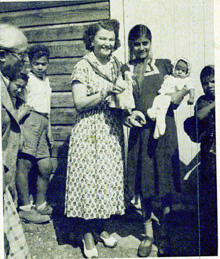 Pictured at right are Mr. and Mrs. Lou Moorsteen visiting Atlit, a camp for Yemenite Jews during their recent trip to Israel. Situated between Tel Aviv and Haifa, this camp has 4,000 inhabitants who have been accustomed to living under the most primitive and oppressed conditions, but are now undergoing a rehabilitation program. Pictured at right are Mr. and Mrs. Lou Moorsteen visiting Atlit, a camp for Yemenite Jews during their recent trip to Israel. Situated between Tel Aviv and Haifa, this camp has 4,000 inhabitants who have been accustomed to living under the most primitive and oppressed conditions, but are now undergoing a rehabilitation program.
Mrs. Moorsteen is shown holding a sweater from the carton of baby gowns, kimonos, sweaters, booties and caps that the members of the Junior Charity League knitted last fall. The infant in the arms of the young mother is wearing a complete outfit from the club. Mrs. Moorsteen carried the precious bundle with her on her trip so that she might personally present the clothes where they would be needed most.
The Moorsteens and their daughter and son in law, Mr. and Mrs. Len Schleider, are now in Paris. Lou will return June 25. Esther will be home early in July.

SAN DIEGO JEWISH WORLD THE WEEK IN REVIEW
Shoshana Bryen in Washington, D.C.: Welcome back, welcome back Berlusconi
Larry Gorfine in San Diego:Jews play prominent roles in S.D. politics
Gary Rotto in Angelus Oaks, California: Debating a professional at a 'big boy' retreat for Jewish leaders at Camp Mountain Chai
Adventures in San Diego History: In 1947, the Jewish community in San Diego was alive with fresh beginnings: A new softball leage, a CARE office, groundbreaking in North Park for Tifereth Israel; a new sefer Torah in Tijuana, and the installation of a Hillel unit at San Diego State
Judy Lash Balint in Jerusalem: 20 ways you know it's Pesach in Jerusalem
Shoshana Bryen in Washington, D.C.: Iran becomes increasingly frustrated in Iraq
Donald H. Harrison in La Jolla, California: Congregation Beth Israel's exhibit shows Israel that American visitors photograph
Rabbi Dow Marmur in Jerusalem: Christian Peacemaker Teams (CPT) provide necessary peace presence in Hebron
Adventures in San Diego History: In 1947 the community was focused on helping survivors of the Holocaust and on establishing such new institutions as Hillel at San Diego State University and a Jewish summer camp.
Donald H. Harrison in Spring Valley, California: Bancroft probed then dismissed 'Lost Tribes of Israel' origin for Native Americans
Lloyd Levy in Eilat, Israel: Eilat: Both a historical and tourist gem
Sheila Orysiek in San Diego: Way it was—a Jewish innocent strikes out
Adventures in San Diego History: Some items from 1947 include a refugee family reunited in San Diego; a new Conservative rabbi takes his post; and a seder is conducted for the residents of the San Diego Hebrew Home for the AgedBarry Jagoda in San Diego: Biblical scholar David Noel Freedman dies
Rabbi Baruch Lederman in San Diego: He flew literally on a wing and a prayer
Rabbi Dow Marmur in Jerusalem: Eric
Yoffie v. John Hagee: Round One
Marissa Palin in San Diego: And what of the women of Passover?
Ira Sharkansky in Jerusalem: Should Palestinians be rewarded for seven years of violence and intransigence?
Adventures in San Diego History: Today we feature stories from the immediate Post-World War II period.
Donald H. Harrison in San Diego: Stop trying to turn Obama into Foxman
Eran Lerman in Jerusalem: Gaza terrorists apparently want to make their own people absolutely miserable
Rabbi Dow Marmur in Jerusalem: Jews must recognize the new Poland
Sheila Orysiek in San Diego: Chapter Three in the serialization of her novel, Reluctant Martyr
Rabbi Leonard Rosenthal in San Diego: Ridding ourselves of spiritual chametz
Adventures in San Diego History: Stories of pre-World War II San Diego
< BACK TO TOP
|
|

 —
—